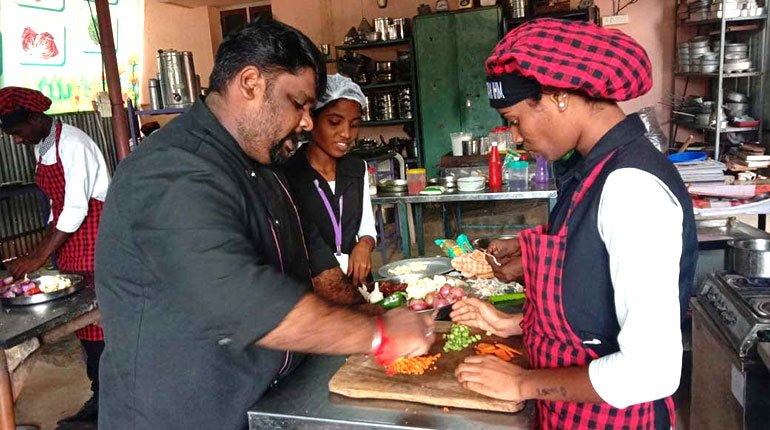Basic Culinary Skills


The Diploma in Food Production is a vocational course that provides students with specialized training in culinary arts, food preparation, and kitchen operations. The duration of the course typically ranges from one to two years, depending on the institution and the specific program.
Course Curriculum:
Basic Culinary Skills
Food Safety and Sanitation
Nutrition and Menu Planning
Baking and Pastry Arts
International Cuisine
Kitchen Operations and Management
Culinary Techniques and Methods
Food Presentation and Plating
Quantity Food Production
Food Costing and Budgeting
Industrial Training/Internship in Commercial Kitchens
Career Opportunities:
Chef:Graduates of Diploma in Food Production can work as chefs or cooks in restaurants, hotels, resorts, cruise ships, catering companies, and other food service establishments. They prepare and cook a variety of dishes, oversee kitchen operations, and ensure the quality and consistency of food products.
Pastry Chef:There are opportunities to specialize as pastry chefs, focusing on the creation of desserts, pastries, cakes, and baked goods for bakeries, patisseries, hotels, and restaurants. Pastry chefs may also work in specialty shops or start their own businesses.
Sous Chef:Graduates may work as sous chefs, assisting head chefs in managing kitchen staff, coordinating food preparation activities, and overseeing the quality and presentation of dishes. Sous chefs play a crucial role in maintaining kitchen efficiency and meeting customer expectations.
Catering Chef:There are opportunities to work in catering companies or banquet facilities, preparing and serving food for events such as weddings, parties, conferences, and corporate functions. Catering chefs may work on-site or off-site, depending on the event requirements.
Food Production Manager:Some graduates may pursue careers as food production managers or kitchen managers, overseeing the day-to-day operations of food production facilities, ensuring compliance with food safety regulations, and managing inventory, staffing, and budgetary matters.
Restaurant Manager:Graduates may transition into restaurant management roles, overseeing the overall operations of restaurants, including front-of-house and back-of-house operations, customer service, staff management, and financial performance.
Food Entrepreneur:There are opportunities to start food-related businesses, such as food trucks, cafes, bakeries, or catering businesses, offering specialty foods, artisanal products, or unique culinary experiences to customers.
Food Stylist:Some graduates may work as food stylists, collaborating with photographers, advertisers, and food companies to create visually appealing food presentations for advertisements, cookbooks, magazines, and other media platforms.
Educator/Trainer:Graduates may pursue teaching or training positions in culinary schools, colleges, or vocational institutes, sharing their expertise and knowledge with aspiring chefs and culinary students.
Research and Development:There are opportunities to work in food research and development, collaborating with food companies, manufacturers, or research institutions to develop new food products, recipes, and cooking techniques.